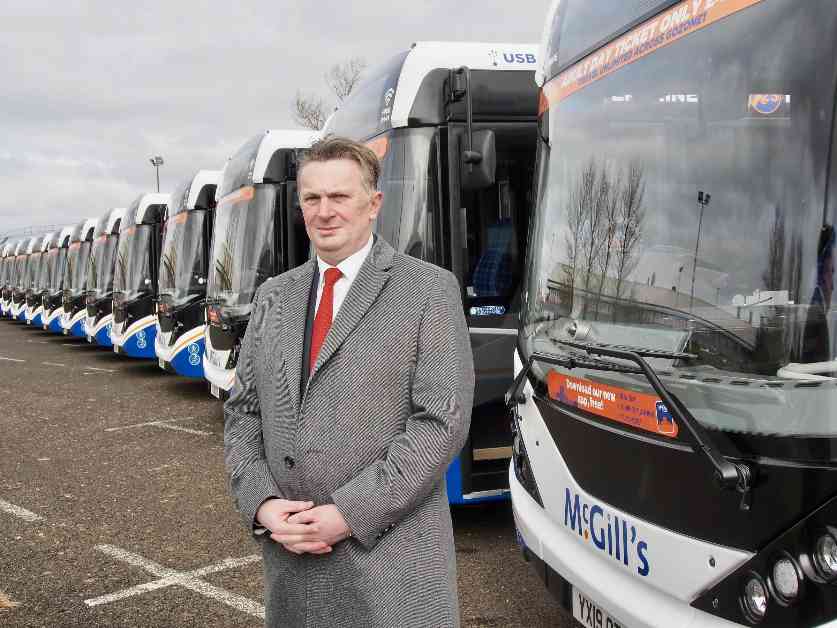One of Scotland’s wealthiest businessmen, Sandy Easdale, has expressed strong criticism of the Labour Party’s plans to enable local authorities to take public ownership of privately owned bus companies. Easdale, who co-owns McGill’s bus company with his brother James, likened the proposed measures to “nationalisation via the backdoor” and drew comparisons between Prime Minister Keir Starmer and Russian President Vladimir Putin.
While the UK Government’s plans would only apply in England, the issue resonates with various Scottish initiatives aimed at bringing buses and public transport back under public control. Campaigns such as Better Buses for Strathclyde and organizations including Get Glasgow Moving, the STUC, Friends of the Earth Scotland, and the Poverty Alliance have advocated for franchising models similar to those utilized in London and Manchester, as well as greater involvement in fare and route decisions.
In an article published in the Telegraph, Easdale voiced concerns that the proposed actions would lead to unsustainable demands from both passengers and bus company staff. He argued that local councils in Scotland, already struggling to manage significantly reduced budgets, would be ill-equipped to operate a reliable and viable bus service. Easdale highlighted the challenges faced by Scottish councils, with seven declaring housing emergencies this year amid heightened pressures and a surge in homeless applications.
Easdale’s sentiments were clear as he stated, “I’ve built a business over 25 years and they want to snatch it away like Putin and offer it to the highest bid.” He expressed doubts about local authorities’ ability to effectively manage bus services, citing their current struggles with basic services like pothole repairs and waste collection.
Despite receiving substantial government subsidies, the bus operator revenue in Scotland remains heavily reliant on public funding. In the 2021-22 fiscal year, over half of bus operator revenue (£329 million, 55%) came from local or central government subsidies, with £223 million originating from the Scottish Government. This financial support, however, has not shielded bus operators from criticism, as evidenced by public backlash against First Bus for discontinuing essential late-night services in Glasgow.
In response to the criticism, Easdale assured, “If a route generates revenue or contributes to the wider network, we will operate it. We don’t eliminate routes unless they are significantly unprofitable.” He expressed concerns about the potential for increased subsidies and inefficiencies under council management, emphasizing the importance of maintaining value for both operators and taxpayers.
Drawing comparisons to other models of public ownership in the UK, Easdale pointed to Manchester Mayor Andy Burnham’s initiatives but questioned the effectiveness of their implementation. He warned against the government’s involvement in business operations, predicting challenges such as aligning driver pay with civil service standards and managing pension schemes. Easdale raised concerns about the financial burden shifting to taxpayers under a public ownership framework.
In contrast, Transport Secretary Louise Haigh defended the government’s plans, emphasizing the importance of buses as essential community services. Haigh highlighted the challenges faced by passengers due to route cuts and service reductions, stating that the proposed measures would empower local leaders to deliver improved bus services efficiently and affordably. She emphasized the government’s commitment to putting passengers first and revitalizing bus services nationwide.
Subheadings:
Challenges Faced by Local Authorities in Bus Service Management
Local authorities in Scotland are already grappling with significant budget constraints and service demands, making the prospect of managing bus services under public ownership a daunting task. Easdale’s concerns about the practicality of council-operated bus services underscore the challenges faced by local authorities in delivering efficient and reliable transportation options to residents.
Impact of Government Subsidies on Bus Operators
The reliance of bus operators in Scotland on government subsidies raises questions about the sustainability and effectiveness of public funding in the transportation sector. Despite receiving substantial financial support, operators like First Bus have faced criticism for service cutbacks, highlighting the complexities of balancing financial viability with public service obligations.
Debating the Pros and Cons of Public Ownership in the Bus Industry
The debate between Sandy Easdale and Transport Secretary Louise Haigh reflects broader discussions about the merits and drawbacks of public ownership in the bus industry. While Easdale raises concerns about government intervention and inefficiencies, Haigh advocates for empowering local leaders to deliver improved services and prioritize passenger needs. The contrasting viewpoints shed light on the complexities of transitioning to a public ownership model in the transportation sector.
In conclusion, the debate over Labour’s proposed ‘bus revolution’ highlights the complexities and challenges of transitioning to public ownership in the bus industry. As stakeholders continue to voice their opinions and concerns, it is essential to consider the practical implications and long-term effects of such policy changes on bus operators, local authorities, and passengers alike. Finding a balance between public interest and operational efficiency will be crucial in shaping the future of bus transportation in Scotland and beyond.
































